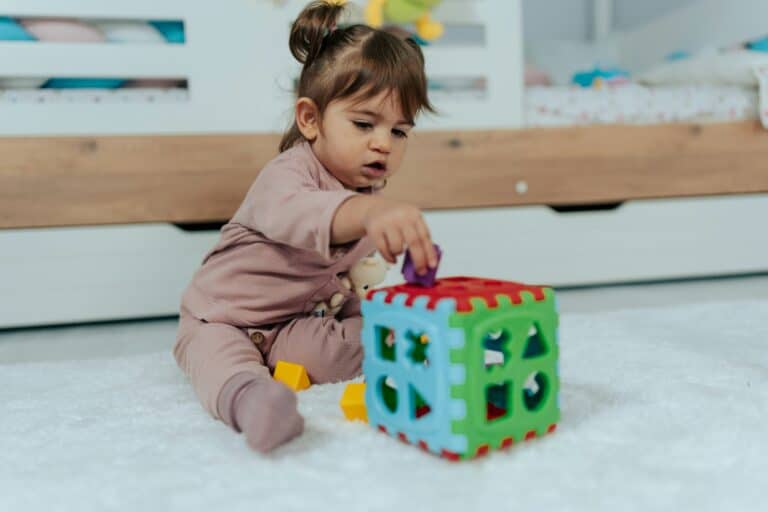
Boost Self-Confidence Through Play
Play is a fantastic way to boost children’s self-confidence. It engages their cognitive skills, promotes problem-solving and creativity, and promotes their sense of independence and self-worth.
Although the “I can do it” phase of toddlerhood can be a challenge, this period is an excellent opportunity for your child to exhibit independence and for you to boost their confidence. So touch as it might be, resist the urge to step in and solve and do for your child because trial and error and failure are part of how learning happens!
Play that Boost Self-Confidence
All play has opportunities to boost self-confidence. However, some types of play and games promote more independence than others. And, you can use purposeful play to enhance your child’s skills.
Open-ended play, such as blocks, bristle blocks, LEGOs (brick blocks), magnet tiles, art, music, dramatic play, sensory play, and science and discovery, creates a multitude of opportunities to explore, create, and problem-solve. Because open-ended toys and play have no “right” or “wrong” way to use them, your child’s play is free to be expansive, and the sky’s the limit regarding creativity.

When your child is engaged in free play, avoid telling them or teaching them how to use the toys. Instead, allow them to experiment and explore freely. If your child encounters a problem, coach them to solve it, but don’t do it for them.
For example, if they are stacking blocks and the blocks continue to fall each time the fourth block is placed on top, you could say something like, “Hmmm, each time you put that fourth block on top, it falls. Do you think there’s another way you could stack the blocks?”
Encouraging your child to solve a problem on their own will boost self-confidence once they solve it!
Questions to promote problem-solving:
- What could you do differently?
- What do you think will happen if you (blank)?
- What would happen if you tried (blank)?
- How could you (blank)?
- Why do you think that’s happening?
Games and Toys to Boost Independence and Confidence
- Blocks and building toys
- Tangrams
- Puzzles
- Board games
- Physical games (soccer, bowling, t-ball, riding a scooter)
- Open-ended arts and crafts
- Dramatic play

If you want more tips on promoting problem-solving, check out this great blog from Mom Junction: 15 Fun Activities to Teach Problem-Solving to Kids
Updated March 10th, 2024, by L. ELizabeth Forry
Related posts

12 Top-Notch Music Books for Kids

Five Easy Ideas for Happy Parents and Happy Kids

10 Magical Christmas and Holiday Apps for Parents

8 Hanukkah Activities for Toddlers and Preschoolers

L. Elizabeth Forry
L. Elizabeth Forry is an Early Childhood Educator with fifteen years of classroom teaching experience. She earned a Master of Science in Early Childhood Education from The University of North Dakota and has a Bachelor of Arts in English and one in Music from Lebanon Valley College. She has taught children in Japan, Washington D.C., Chicago, and suburban Maryland. She is trained as a reading therapist, has a TEFL certification, and has done extensive work with children regarding mental health, social-emotional development, gender development. She has written curriculum for children and educators and has led training sessions for parents and educators on various topics on early childhood development. She is the mother of two boys and resides outside of Annapolis, Maryland.
Related posts

12 Top-Notch Music Books for Kids

Five Easy Ideas for Happy Parents and Happy Kids

10 Magical Christmas and Holiday Apps for Parents





